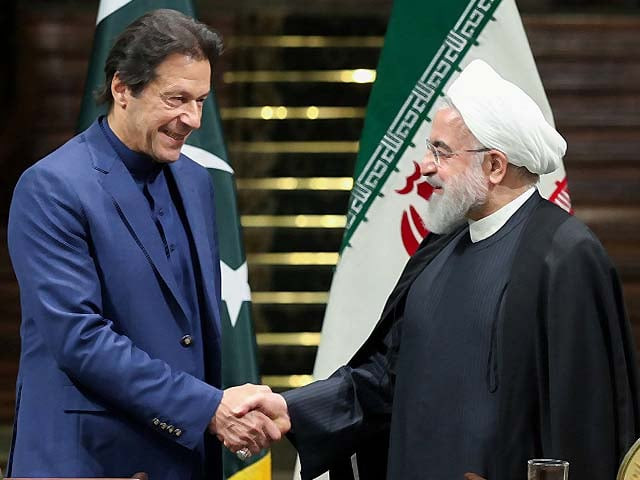The recent visit of Afghanistan’s foreign minister to Iran helped revive their relation which had slightly deteriorated after the deaths of three Afghan refugees in a fire in Iran. A few weeks ago, Pakistan’s army chief made a trip to Kabul which further strengthened the previously weak but improving relationship between the two neighbours. More importantly, in a recent telephonic conversation between the military chiefs of Iran and Pakistan, both the leaders agreed to enhance cooperation to maintain border security and prevent terrorist moves on common borders. With improved relations between each other, and also with Afghanistan, Pakistan and Iran can potentially assist in achieving peace in their war ravaged neighbourhood.
Since the signing of the US-Taliban agreement, Afghanistan has been facing three sets of challenges in pursuit of viable and lasting peace. The need to bring a considerable reduction in fighting and violence between warring parties is imminent to initiate all-Afghan talks. The uncertainty around the opening of intra-Afghan talks and volatility resulting from clashes between the US led Afghan government forces and the Taliban have been providing greater leverage to existing terrorist organisations to assemble, which would pose certain difficulties to Afghans to deliver their commitments in the short to medium run. Moreover, geopolitical rivalries, especially US-Iran and India-Pakistan tensions, also bear implications for the peace and future of Afghanistan in the medium to long run.
Nonetheless, a joint Pakistan-Iran (Pak-Iran) effort could not only help keep things on track and expedite a politically negotiated peace but also be instrumental in mitigating the terror threat emanating from Afghanistan and the geopolitical rivalries. The geographical and cultural attachment of Pakistan and Iran with Afghanistan provides them with a unique understanding of the country. Both the nations also exert a certain amount of influence over various Afghan factions. Additionally, their ongoing fight against terrorist organisations and the successes both the nations have reaped in the past could greatly contribute to contain Daesh and al-Qaeda related threats in Afghanistan. Moreover, the equation of Pakistan’s good ties with the US and a workable Iran-India relation could be helpful in reducing US-Iran and India-Pakistan tensions impacting Afghanistan. Notably, for their core economic and strategic interests, a stable Afghanistan is equally important for both Tehran and Islamabad, and the signing of the US-Taliban peace agreement provides a unique window of opportunity to that end.
Both Iran and Pakistan supported Afghan mujahedeen factions and resisted the Soviet invasion of Afghanistan. Although both the nations remained bitter rivals in the post-Soviet withdrawal power vacuum scenario with military assistance to rival factions (the Taliban and the Northern alliance respectively), the US invasion of Afghanistan and subsequent developments once again aligned the interests of the two. Especially, in the post-2014 scenario, ever since the US has shown its willingness to carry out a force withdrawal from Afghanistan, Pak-Iran interests have converged significantly. Notably, annihilation of the Daesh led terror threat is not only crucial for their national security interest but also to attain a workable environment for their crippling economies. Tehran and Islamabad also wish to repatriate millions of Afghan refugees they have been hosting for decades. Therefore, it is imperative for Iran and Pakistan to put their best efforts to help achieve a politically settled peace, especially to avoid a scenario similar to that of post-Soviet withdrawal.
To that end, both the nations have been supporting an Afghan-led and Afghan-owned peace process to bring an end to conflict in Afghanistan. Interestingly, both Iran and Pakistan have improved their relations with former rival Afghan factions, especially Tehran’s recognition of the Taliban insurgency and close consultations during the peace process have helped remove a crucial bottleneck. The welcoming and positive gestures of Afghanistan’s Head of the High Council for National Reconciliation, Abdullah Abdulah -- one of the leaders of the former Northern Alliance -- towards both Pakistan and the Taliban is also encouraging. Tehran has also been maintaining close and cordial relations with Afghan President, Ashraf Ghani. Although at certain instances, Ghani remained critical of Pakistan, the latter’s continuation of a welcoming policy towards all Afghan factions has helped improve ties with Ghani as well.
In a recent conversation between Ghani’s newly appointed foreign minister and his Pakistani counterpart, both sides agreed to work jointly with regional countries for an immediate ceasefire and starting intra-Afghan dialogue. In this regard, both Iran and Pakistan joined Russia and China in a fresh joint consultation where all the regional powers extended their full support to achieve comprehensive and sustainable peace at an early date. By virtue of their historical experience and current state of better ties with involved regional powers and almost all Afghan factions, both Islamabad and Tehran can help kick start the all-Afghan talks and are also suitable to play the role of mediators to monitor and observe the negotiations in order to forgo any unforeseen situation and meet a constructive conclusion.
However, the US remains wary of any kind of Iranian involvement in Afghan affairs, despite the fact that the latter has played a significant role in overcoming the recent Afghan leadership conundrum and the creation of an inclusive government. For the reason that Pakistan has been playing a key role in the ongoing US led peace process and the country looks after Iranian interests in the US ever since Tehran-Washington diplomatic relations were severed, the US needs to trust Pakistan to deal and monitor a constructive Iranian involvement in Afghanistan. This would also help the US find a balance between the complex India-Pakistan-Taliban triangle.
The severity of Washington’s concerns regarding the trio is reflected in US Special Representative for Afghanistan Reconciliation, Zalmay Khalilzad’s recent multinational trip to Doha, New-Delhi and Islamabad. India considers the Taliban as terrorists and there is a history of bitter animosity between the two. On the other hand, Pakistan has blocked India’s land access to Afghanistan for its role in supporting anti-Pakistan miscreants conducting cross-border attacks. Pakistan also believes that India has little or no role to play in Afghanistan. Whereas, Washington promotes and encourages a greater Indian role in the war torn country. From the recent statements of the Afghan insurgents, Pakistan and measures taken by the US. Khalilzad’s trip, which was aimed at finding common grounds between the Taliban, India and Pakistan seemed not to be successful. Under the circumstances, Iran with workable relations with Islamabad, New-Delhi and the Taliban, remains the only hope which could play its role to reduce their tensions and find a common ground. Thus, the US may bargain and accept Tehran’s constructive involvement in Afghanistan in return for Iran recognising the US led peace process and mitigating Pakistan-India-Taliban tensions.
By and large, both Pakistan and Iran need to establish a joint mechanism directed towards employing their experience and influence to help resolve Afghanistan’s immediate, medium and long term challenges. The joint commission through consultations with all Afghan factions could help reach a comprehensive ceasefire and expedite the peace process. Their successful anti-terror experience in the past could be instrumental against Daesh in Afghanistan in the medium run, which in turn would help them restrict the transport of militancy to their restive provinces of Balochistan and Sistan-Balochistan. The joint commission could also be working simultaneously towards repatriation of refugees. More importantly, both Islamabad and Tehran would be able to put in effort to mitigate the geopolitical rivalries imacting peace efforts and the future of Afghanistan. Thus, for a viable and lasting peace and stability in Afghanistan the US needs to support and encourage a joint Pak-Iran endeavour.



COMMENTS
Comments are moderated and generally will be posted if they are on-topic and not abusive.
For more information, please see our Comments FAQ